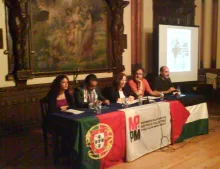63 years of Nakba, 63 years of ethnic cleansing in Palestine, evoked in session organized by MPPM
It was with heartfelt emotion that many people who gathered at the Casa do Alentejo, Lisbon, on last May 16 at the invitation of MPPM, to mark the 63rd anniversary of the Nakba - the Catastrophe - responded to the interventions of the different speakers.First spoke Maria do Céu Guerra, President of MPPM, who described the long process of occupation of Palestinian land by the Zionists and the consequent expulsion of its inhabitants.Fixing its inception in 1897, following the first Zionist Congress held in Basel, which established as a goal to create a home for the Jewish people in Palestine, an objective confirmed five years later with the creation of the Jewish National Fund to acquire land in Palestine that should be handed "empty of its Arab inhabitants." Since then, the Palestinian people were persecuted, expelled from their land, deprived of their possessions, decimated.But as warns Maria do Céu Guerra to end her speech, "A long fight is ahead, but apartheid has also fell. It is time for us to hold hands for a Palestinian state, it's time we take in our keys and open the closed doors of our houses - the house of tolerance, the house of dialogue box, the house of confidence. And we, the international community, it is time to be firmer than ever and not let ourselvesbe deceived any more. "Then, Carlos Almeida, of the National Directorate of MPPM, denounced the way in which was planned and executed the ethnic cleansing of Palestine: "The dream of an ethnically pure Palestine lived in the heart of the Zionist project since its birth. Since the mid-thirties at least what was a dream was, however, continuously and gradually converted into a meticulously planned and executed strategy."Refusing to reduce Nakba to the events of May 1948, Carlos Almeida said: "The Nakba is, first, a silent but incessant battle to redeem the past, the right to the memory that is flesh and blood of all peoples of all world cultures. Evoking the Nakba is to remember how all those crimes were carried out amidst almost total silence and passivity on the part of the international community. (...) Sixty-three years later, to evoke the Nakba is a requirement from the future, because any solution to the so-called Palestinian question, to be dignified, just and lasting, must be built upon the recognition of the wounds, and never on their oblivion."He advances, however, a message of hope: "Sixty-three years on the Nakba, however, there are substantial grounds for hope. The great and courageous demonstrations that took place yesterday in the occupied territories, Israel and, in particular, in the Syrian, Lebanese and Egyptian borders, are a sign of this. (...) But beyond the importance of this regional context, the strength, courage and determination involving the manifestations of this week-end are inseparable from the news of the recent agreement of understanding between the different forces of the Palestinian national resistance movement. "This was followed by the exhibition of the short film "A Letter from Sarah", directed by Jan Kot Muraz, where Sarah, a 12 year-old Palestinian girl, reports her daily life, her home, the refugee camp where she lives, the narrow alleys where she plays, her makeshift toys and games, at the same time giving her view on the conflict, her admiration for her brother who, with the other guys, defends the community responding with stones at Israeli soldiers' bullets.Journalist José Manuel Rosendo commented on the film, adding the experience of his many trips to Palestine. He described the life of Palestinians under occupation, the humiliation of check-in points. He recalled that the siege of Gaza resulted from the refusal by the international community to accept the outcome of elections that international observers had regarded as free, democratic and fair.He considered as a positive step the recent reconciliation agreement between various Palestinian forces and, concerning the current position of Israel, that does not accept Hamas as a negotiating partner for peace, noted that the same argument had been used, in particular against Yasser Arafat and Abu Maza, to conclude that Israel has no right to decide who should head the government of Palestine. Israel can only require the other party to negotiate in an open, transparent and honest way and to respect what is agreed.Closed the session Dr. Mufeed Shami, Ambassador of Palestine in Portugal. He recalled, too, the massacres that constituted the Nakba, "Yesterday we celebrated 63 years of Nakba, the catastrophe of Palestine and the Palestinians, which began with the 1897 Zionist Congress in Basel, Switzerland, and culminated on May 15, 1948. That day, the State of Israel was established by force of arms on the ruins of our homeland and the crimes and massacres have resulted in the exile of our people inside Palestine, the refugee camps and the diaspora. Can our people and the world forget the massacres of Deir Yassin, Qibia, Nahalin and other massacres committed between 1947 and 1948, apart from further massacres? (...) During these 63 years of Nakba thousands of people were killed, injured, made prisoners and exiled because they refused to live under occupation and chose freedom and independence."He outlined the strategy of the Palestinian Authority: "Despite this enormous disaster, the option for peace was our only strategic choice to establish a just, comprehensive and lasting peace in the Middle East in accordance with UN resolutions 242, 338, 425, 194, 1397, 1515 and other international agreements, with special reference to the road map adopted by the Quartet formed by the United Nations, European Union, the United States and Russian Federation .(...) The Palestinians cannot accept any solution other than the complete withdrawal of Israel from their territories to the borders of June 4, 1967 and the dismantling of all settlements because they are considered illegal under international law. There will never be peace and security under occupation and colonization. (...) Despite the systematic Israeli rejection of all peace initiatives that could lead to a comprehensive and lasting peace in the Middle East, the Palestinian leadership headed by President Mahmoud Abbas announced our national strategy for ending the occupation and for independence"

